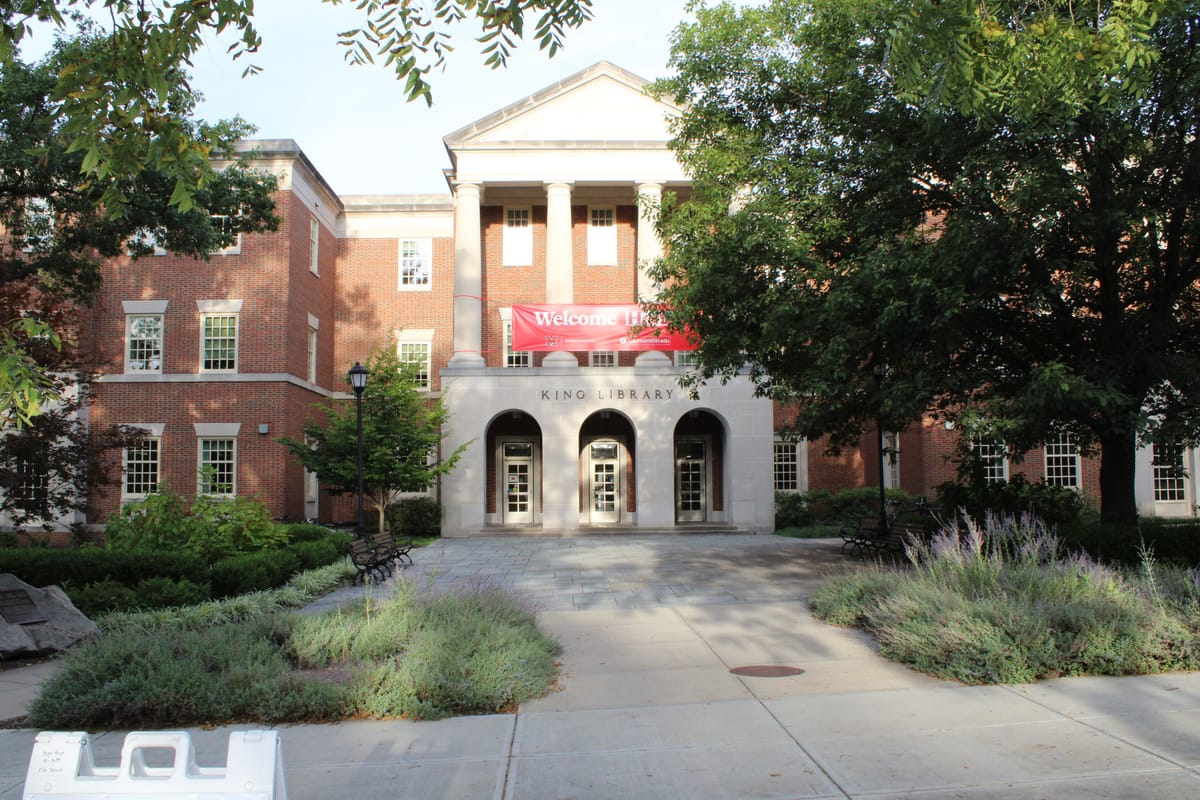Miami librarian says community programs, classes at risk during union bargaining
Some educational programming held by Miami University librarians could be at risk based on negotiations to establish a contract with the new union, one librarian said.

Editor's Note: This story was updated on Nov. 25 with an additional statement from Miami University. A spokesperson wrote that the university will "continue to provide robust community programming" despite "claims of a perceived reduction in services."
As negotiations for a new contract continue between Miami University and the Faculty Alliance of Miami (FAM) Librarians unit continue, a new sticking point has come up: service.
Rachel Makarowski, a special collections librarian and lead organizer for the FAM Librarians unit, said recent proposals from administration at the bargaining table could impact community offerings if passed. In October, Makarowski said, the negotiating team for administrators argued that librarians could not teach any courses as the instructor of record or equivalent.
When pushed about whether this proposal would impact offerings at the Institute for Learning in Retirement (ILR), a popular program that offers dozens of classes for retired adults in Oxford, Makarowski says the negotiators for administration said yes.
“Folks in my department here in special collections have [taught ILR classes] since I joined the university in 2018,” Makarowski said. “We asked if that would be included in what would be stopped, and they were like, ‘Yes, because we believe that that falls outside your scope of duties.’”
An administrative proposal on credit-bearing courses dated Sept. 18 states that being the instructor of record or holding an equivalent status would fall outside librarians’ job duties. The proposal states that librarians could still accept work as instructors, but the work would not be covered by the agreement. Under the proposal’s language, librarians would need to “ensure that any work performed as an instructor of record is conducted outside of the Librarian’s assigned job duties and standard work day.”
During a November bargaining session, Makarowski said the university and FAM Librarians unit agreed to count service and scholarship as workload, but not under primary job responsibilities. Makarowski interpreted the distinction to mean that once librarians advance to the level of principal librarian, service and scholarship would no longer count as workload. The agreement was not within the credit-bearing courses proposal.
“We do actually end up creating a lot of different programming for the community [through service and scholarship],” Makarowski said. “It’s what allows us to go out and capture things like oral histories. It’s what allows us to do things like help with some of the summer camps that visit the university, so we very much were taken aback by that.”
According to a statement provided to the Oxford Free Press by a university spokesperson, the university “remains committed to engaging in good faith negotiations and reaching an initial contract” with the FAM Librarians unit. “The parties have made good progress toward reaching an initial contract,” the statement continues.
The spokesperson initially declined to answer specific questions regarding the university’s position on how current negotiations could impact community programming and service for the broader Oxford community. An updated statement sent to the Free Press following this story's publication in print on Nov. 22 stated that the ILR "as well as the University Lecture Series, continue to provide robust community programming and will do so going forward," "despite claims of a perceived reduction in services" based on flyers distributed by FAM. The statement did not clarify whether library union negotiations would impact these programs.
The FAM Librarians unit penned an open letter to Jerome Conley, Dean of Miami’s libraries, on Nov. 20, asking Conley to advocate for librarians during the negotiating process.
Bill Wortman, a retired librarian and Oxford resident, has enrolled in several ILR classes taught by librarians in the past few years, including one taught by Makarowski. Those classes included the history of the book and printing, and Wortman remembers each class having six to 10 people in it.
“A lot of people are interested in books but aren’t fully aware of … what the process is that makes a book public and effective,” Wortman said. “So they were learning something they didn’t know but were interested in knowing.”
Worman said his fellow classmates were engaged in each ILR class, and he also came away having learned something new each time despite his own background as a librarian.
“[Miami’s librarians] have an obvious subject knowledge that nobody else in town in southwest Ohio has,” Wortman said. “To somehow make it so they can’t benefit from that is just pretty darn … ignorant of what librarians with subject expertise can contribute, not just to the work, but then to the community as a whole.”
FAM maintains a bargaining tracker which shows proposals and counterproposals from the bargaining unit and Miami administration. The most recent proposal from administration on the scope of librarian duties states that job assignment for assistant, associate and principal librarians “includes the performance of Scholarship and/or Service.”
The proposal, dated Sept. 18, also states that librarians would be subject to flextime and compressed workweek assignments. FAM’s November counterproposal instead states that librarians should be expected to work 40 hours per week on aspects of the job including service and scholarship and receive “appropriate compensation” for overtime work.
During a Nov. 13 bargaining session, administrators increased proposed annual raises from 1.25% to 1.5%. FAM’s proposal includes an annual maintenance increase of $1,900 plus a 9% raise during the current fiscal year, down from a previous proposal of 9.5%. The current FAM librarians proposal also has an increase of $1,400 plus a 6% or inflation rate raise in the next fiscal year, whichever is higher.



